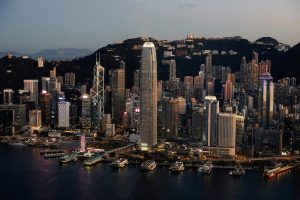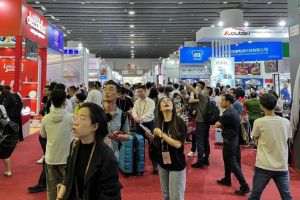Civic authorities in Shanghai have begun taking apart fences around housing areas and scrapping police tapes from public squares and buildings ahead of the lifting of a two-month lockdown at midnight.
The prolonged isolation fuelled public anger and rare protests inside Shanghai and battered the city’s manufacturing and export-heavy economy, disrupting supply chains around the world, and slowing global trade.
Life is set to return to something more like normal from Wednesday, when the passes issued by residential buildings for people to go out for a few hours will be scrapped, public transport will resume and residents can go back to work.
On Monday evening, some people allowed out of their compounds for brief walks took advantage of suspended traffic to congregate for a beer and icecream on deserted streets, but there was a sense of wariness and anxiety.
Most will be stuck indoors again until midnight, as they have been for the past two months under a ruthlessly enforced lockdown that has caused income losses, stress and despair to millions struggling to access food or get emergency healthcare.
“Now that I’m going back to work so suddenly, I feel a little nervous,” said resident Joseph Mak, who works in education. “It’s hard to believe it’s actually happening.”
The easing of Shanghai lockdown applies only to those in low-risk areas, or about 22.5 million people. Residents will still have to wear masks and are discouraged from gathering.
Dining inside restaurants remains banned. Shops can operate at 75% capacity. Gyms will reopen later.
Residents will have to get Covid tests every 72 hours to take public transport and enter public venues. Tough quarantine is still in store for anyone testing positive and their close contacts.
Lockdown-Wary Shanghai Residents
The end of the lockdown brings relief, but is also being met with apprehension.
China is alone among major countries enforcing an uncompromising “zero Covid” policy that aims to eradicate all outbreaks as soon as they occur at just about any cost.
The highly-transmissible Omicron variant is prone to making comebacks and it remains to be seen if frequent testing can keep it under control.
Todd Pearson, managing director of Camel Hospitality Group, which operates eight restaurants, four bars and three gyms in Shanghai and neighbouring Suzhou, is wary.
His restaurants are only allowed to do deliveries, which amount for about 5% of revenue, not enough to pay salaries and rent. At least from midnight his workers who have been sleeping in the restaurants, stuck there due to the strict lockdown rules, can finally go home.
“I’m hopeful that they will rush things along quickly to restart the economy,” Pearson said. “I just hope it’s not at the cost of more outbreaks. I’m not sure many businesses or the people could handle much more.”
Economic activity in China has somewhat recovered in May from a dismal April as Covid curbs in major manufacturing hubs were gradually relaxed, although movement controls still depressed demand and restrained production.
Factory activity was at a three-month high in May, but contracted from a year earlier.
Shanghai’s New Normal
Shanghai reported 31 cases for May 30, down from 67 a day earlier, all within controlled areas. The downtrend in cases could be noticed in many other cities in China, with new daily infections falling to 174 from 184, nationally.
Other countries, which have decided to co-exist with the virus even as infections spread, are reporting tens of thousands of new cases daily.
Once the Shanghai lockdown is lifted, life will still look very different in the city compared to those places.
Some banking clerks said they will be required to wear full hazmat suits and face shields as they start facing the public from Wednesday.
One banking worker, who only gave his surname as Qin, said he would take some basic supplies to work, in case a colleague tests positive and staff are required to isolate in the office.
“I need to pack some clothes and supplies to leave at the office. Just in case,” Qin said.
The lockdown has fuelled rare protests, with people at times banging pots and pans outside their windows to show their discontent with the strict measures, and many taking to social media to share frustrating interactions with authorities and other personal dramas caused by the restrictions.
The public anger comes during a sensitive year for President Xi Jinping, who is widely expected to secure a precedent-breaking third leadership term this autumn.
One complex on Tuesday hanged a Chinese flag for residents to take pictures with as they lined up for one more PCR test before the reopening.
“It’s worth celebrating,” said one volunteer worker at the testing site, waving a small Chinese flag, who was more optimistic about Covid than those getting their noses swabbed. “Probably we won’t have it again in the rest of our lives.”
- Reuters with additional editing by Jim Pollard
ALSO READ:
Beijing Looks Busier, Shanghai Nears an Uncertain Reopening
Shanghai, Beijing Take More Steps Back Toward Normal Life
Shanghai Crawls Closer to Reopening, Beijing to Ease Curbs
























